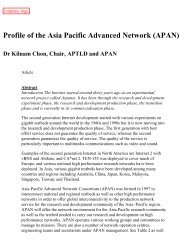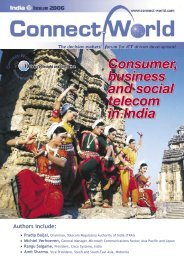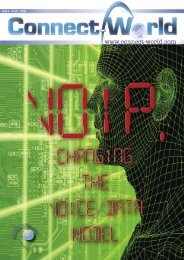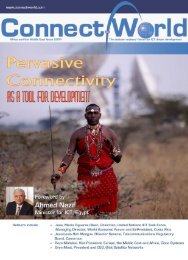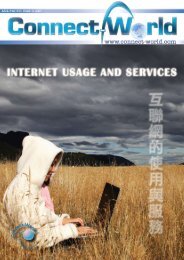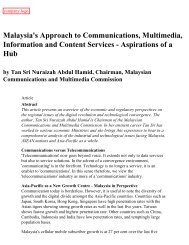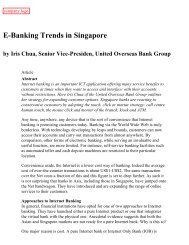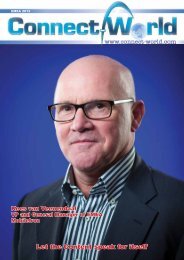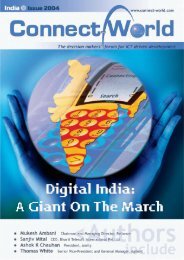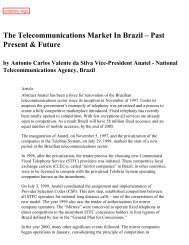Contents - Connect-World
Contents - Connect-World
Contents - Connect-World
Create successful ePaper yourself
Turn your PDF publications into a flip-book with our unique Google optimized e-Paper software.
<strong>Contents</strong><br />
3 & 4 - <strong>Connect</strong>ions 63 - Last Words 64 - Reply Card<br />
6<br />
Global development<br />
ICTs–Developing the human potential<br />
by Ambassador Dr Makarim Wibisono, Republic of Indonesia;<br />
Member of the UN-ICT Task Force; Former President of the United<br />
Nations Economic and Social Council<br />
ICTs boost economic and social development, help combat<br />
poverty and promote equality and gender empowerment.<br />
Developing countries trying to implement ICTs have often failed<br />
due to the quality of the available human resources. To foster<br />
sustainable human development, a concerted effort is needed<br />
to integrate ICTs into educational programmes and to promote<br />
learning as a basic human right.<br />
26<br />
Developing regions and<br />
technology<br />
<strong>Connect</strong>ing people—new technologies,<br />
new hope<br />
by Bill Owens, President and CEO, Nortel Networks<br />
For many of the worlds inhabitants telephone service is still a<br />
luxury. Half of Africas 800 million people and 75 per cent of<br />
China's 1.3 billion inhabitants have never made a phone call.<br />
Converged networks, using packet technologies, can make<br />
communication affordable and revolutionize the lives of such<br />
peoplehow they work, learn, receive medical services, travel<br />
and entertain.<br />
11<br />
14<br />
National development<br />
Pervasive connectivity—towards building<br />
a knowledge society in Malaysia<br />
by The Honourable Dato’ Seri Dr Lim Keng Yaik, Minister of<br />
Energy, Water and Communications, Malaysia<br />
Malaysia needs to build its ICT infrastructure and increase the<br />
effective use of information technology to make the transition<br />
from a low technology, labour-intensive economy, to a high<br />
value-added economy. It is extending access to all segments of<br />
society by providing access in government departments,<br />
schools, research institutions, hospitals, libraries and community<br />
centres.<br />
Digital television broadcasting in<br />
Australia<br />
by Lyn Maddock, Acting Chair, Australian Broadcasting Authority<br />
Digital television broadcasting is now available to more than<br />
90 per cent of Australias population. The Australian<br />
Broadcasting Authority (ABA) has taken care to protect the<br />
rights of consumers, create a competitive market place, and<br />
foster the development of new broadcasting and data services<br />
during the transition to digital.<br />
29<br />
33<br />
Business development<br />
Asian tigers in a global market—technology<br />
implications for smaller organisations<br />
by Derek Williams, Executive Vice-President, Oracle Corporation, Asia<br />
Pacific Division<br />
Most large enterprises and governments across Asia Pacific have<br />
embraced Internet-based business processes and application.<br />
Behind these large organisations, a network of small and midsize<br />
enterprises dominates Asia Pacifics business and is the backbone<br />
of the global commerce value chain. Asia Pacifics smaller<br />
organisations can become more competitive in the global value<br />
chain through strategic adoption of IT.<br />
Mobility and small business<br />
Mobile enterprise: big opportunities for<br />
smaller firms<br />
by Mats Victorin, Regional Head, Asia Pacific, Ericsson Enterprise<br />
19<br />
Implementing policy to bridge Korea’s<br />
digital divide<br />
by Dr Yeon-Gi Son, President/CEO, Korea Agency for Digital Opportunity<br />
and Promotion.<br />
As the business world becomes more global, enterprises, especially<br />
smaller one need to be more responsive, more available,<br />
more flexible and more efficient than ever Mobile enterprise<br />
solutions and services can play a key role in leveling the playing<br />
field for SMEs. For operators, this represents a great competitive<br />
opportunity to address the valuable enterprise segment.<br />
Korea, an information society leader, has the worlds highest<br />
broadband Internet penetration. The governments policies aim<br />
at promoting the digital inclusion of Korean society as a whole.<br />
The government provides many with subsidised or free equipment<br />
and Internet access. Now its focus is shifting towards promoting<br />
the more effective use of IT.<br />
Regional development–wireless<br />
broadband<br />
22<br />
Tax Office tip: to try technology; talk to<br />
taxpayers<br />
by Bill Gibson, Chief Information Officer, Australian Taxation Office<br />
36<br />
Broadband wireless, people and the<br />
economy<br />
by Guy J. Kelnhofer III, President and CEO, NextNet Wireless, Inc.<br />
Australias Tax Office has been working to make it easier and<br />
cheaper for people to comply with their tax obligations. Its<br />
Listening to the community programme and Simulation<br />
Centre allow designers and users of the tax system to share<br />
experiences. As a result, a series of on-line systems now provide<br />
businesses and tax agents with higher quality, more timely<br />
information.<br />
Asias Internet driven integration into the global economy has<br />
fuelled job creation. Workers migrating to regions with essential<br />
services and jobs bring crowding and overload the service in<br />
these regions. These jobs are terrific for economies and people,<br />
but threaten traditional family structures and debilitate regions<br />
left behind. Wireless broadband can inexpensively connect<br />
these regions and help reverse this decline.<br />
All articles are available online at: www.connect-world.com 1



